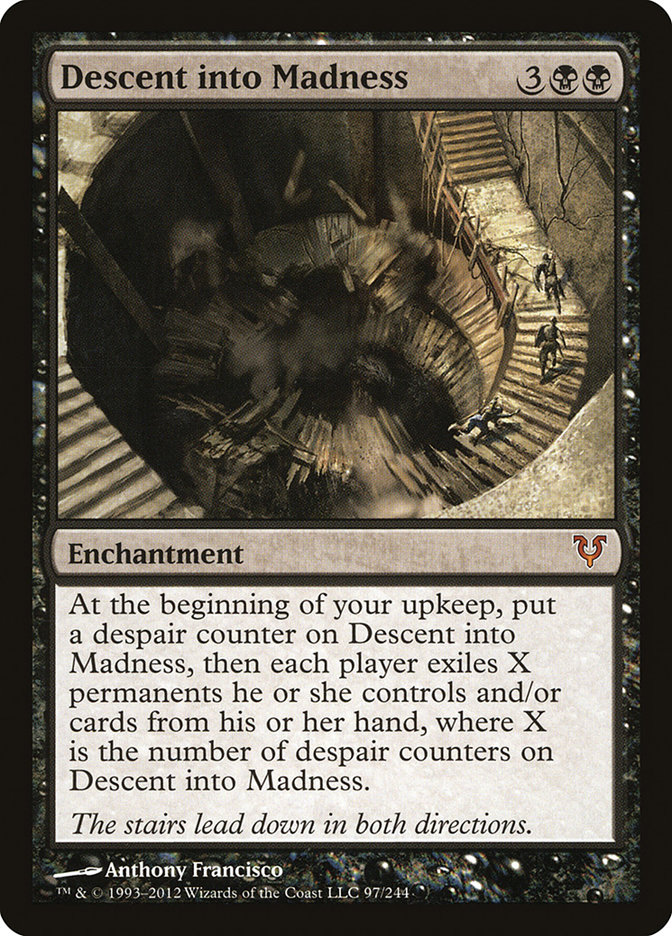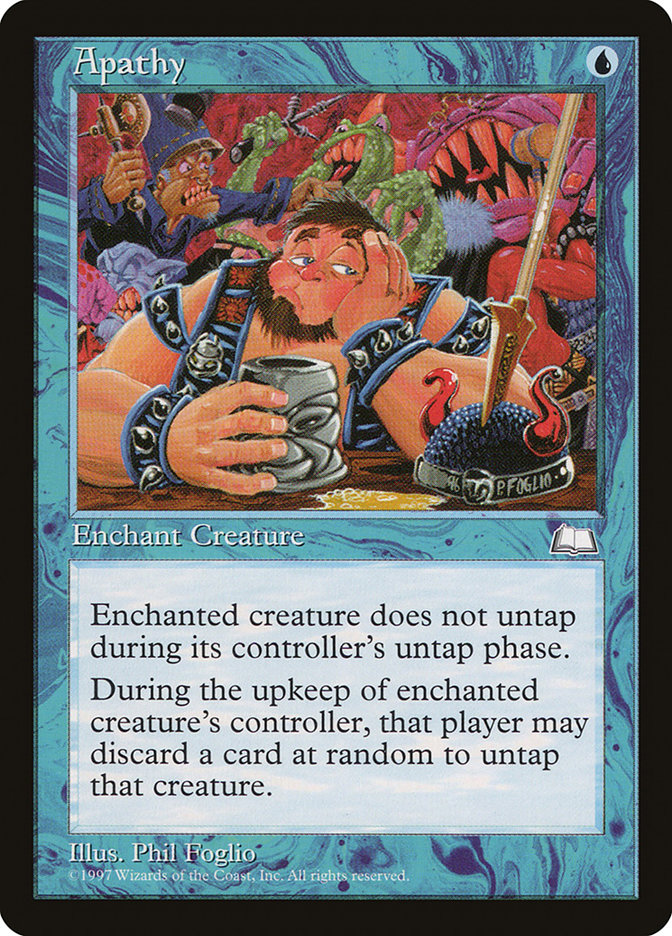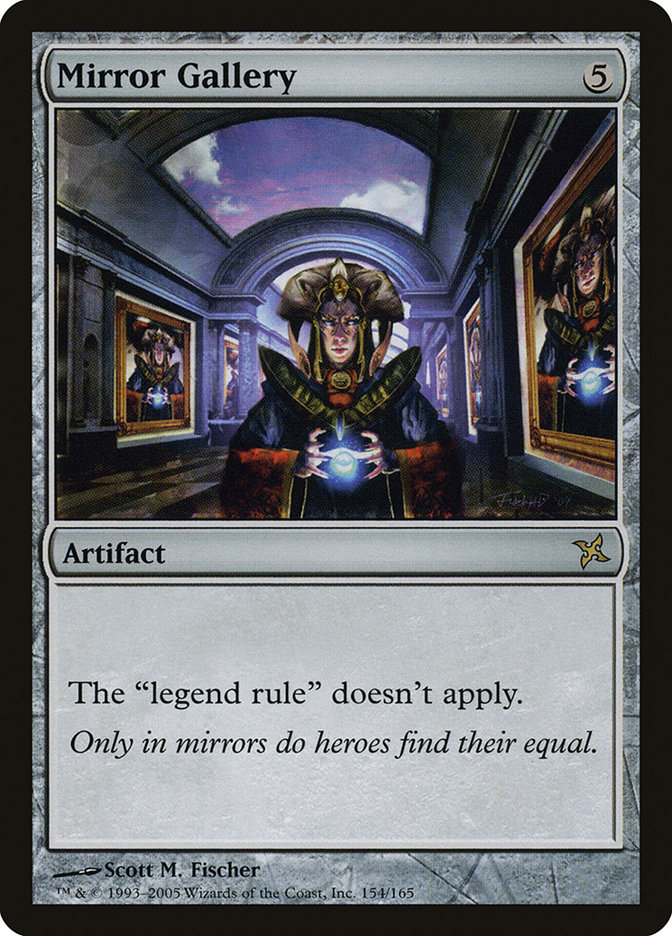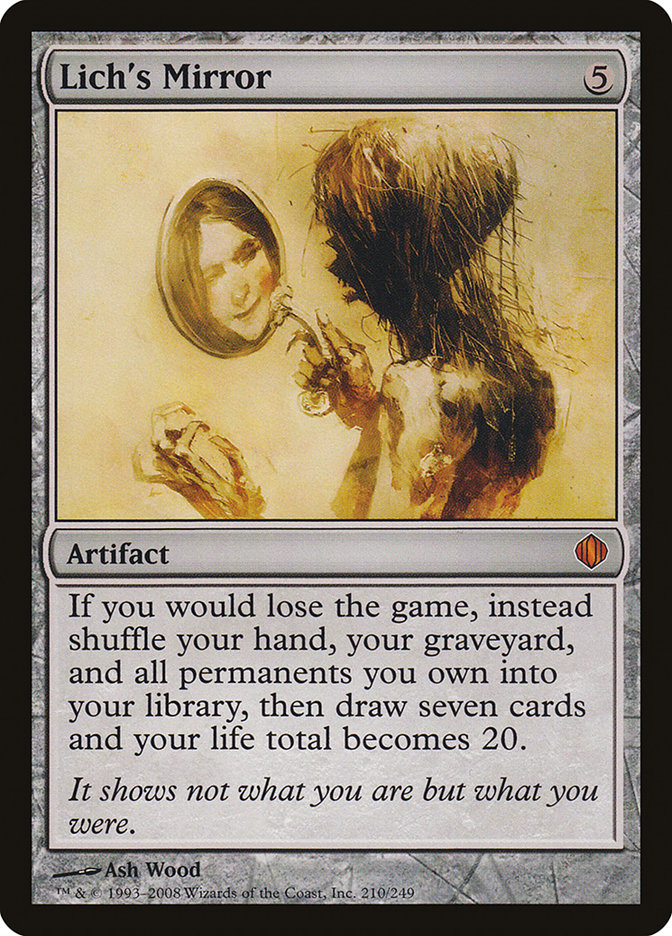Magic is draining.
Not draining in the same way that playing a physical sport is but in a way
where one’s body still has energy, but the driver is checked out, so to
speak. In some ways it’s because Magic is a game that combines
memorization, problem-solving skills, and math. In other ways, it’s because
Magic is a game that demands quite a bit of its participants in the
department of emotions.
“Tilt!”
Tilt is a term that’s primarily taken from poker, used to describe one
being knocked off-balance mentally. The way that people tend to use the
phrase is when they have to deal with a play or loss that can be difficult
to stomach–be it losing a game to a one-outer, getting blown out by the
fourth Force of Will, or punting an on-board lethal.
Most people have experienced emotions that could stem from being tilted,
whether or not they’re familiar with the jargon. It’s difficult to control
and easy to go on a depressive spiral as a result of it. It’s easy to get
sucked into, and being a notable player in the community doesn’t make one
impervious to its effects. In fact, it may make one more susceptible. Last
weekend, I played in #SCGDC and
personally dealt with such a rough tilt that I found myself literally
questioning life decisions past the point of being healthy over a few games
of Magic.
For the decklist crowd, I ended up borrowing Elves master Julian23’s list
from Andrew Maine in time to play a few games and shake off the rust before
the tournament:
Creatures (28)
- 4 Wirewood Symbiote
- 4 Quirion Ranger
- 1 Birchlore Rangers
- 4 Heritage Druid
- 4 Nettle Sentinel
- 4 Elvish Visionary
- 2 Craterhoof Behemoth
- 4 Deathrite Shaman
- 1 Reclamation Sage
Planeswalkers (2)
Lands (20)
Spells (11)
Sideboard

Going into the weekend, the biggest draw to Elves was that it was
well-suited to beat the Delver decks that were successful at Eternal
Weekend last weekend. Being
softer to combo decks feels bad, but with all of the sideboard options
afforded to the deck via Bayou, it’s easy enough to have some semblance of
game post-board.
Playing against Storm rounds three, four, six, and seven was pretty rough;
six mulligans to five or less cards in as many rounds weren’t doing me any
personal favors either. Despite eeking out a victory against one of the
opponents, I still found myself against the wall at 4-3, despite feeling
like I’d made the most responsible decisions I could given circumstances
and being unsure of what I could’ve done differently. After a few
rough weeks
in Opens, this triggered a stream of incredibly unhealthy thoughts:
”
My decisions don’t matter. I’m not cut out for this because I keep
making the correct decisions and having them invalidated. No matter how
good my deck is for the weekend I’ll get paired up with unwinnable
matchups. The only reason some of my peers are held in higher regard is
because they’ve gotten luckier. I deserve to be winning more than I
do.”
There’s a lot to unpack here, and the spiral gives us a look into a lot of
things that can trigger egregiously negative emotions. A large part of
combating tilt is going to stem from identifying the root cause of the
feel-bads.
“My decisions don’t matter.”
First of all, they do. Second of all, this kind of thinking stunts growth
in an incredibly unhealthy way. Rather than accept things that could have
been changed in-game, this shoves personal responsibility onto
circumstances that are out of one’s control. Going too far down this train
of thought is going to do two things: allow a victimizing mentality to
fester and decrease personal analysis.
”
I’m not cut out for this because I keep making the correct decisions
and having them invalidated.”
Not every decision is correct, despite how correct it may look at the time.
Retrospect is important, and improving on one’s decision-making process is
arguably the most important aspect of being a successful player and person
alike. Nobody likes the idea that their decisions are completely
irrelevant, but the best way to combat this type of thinking is to consider
whether or not every decision is being invalidated–or just the
ones being noted at the time.
One of the best ways to dig oneself out of this issue and the one directly
preceding it is to try and consider if you’re examining all of the
decisions that could be made in order to arrive at a situation. It’s easy
to assume that you’re making all of the decisions correctly if you’re only
viewing half of the decisions. Working harder to examine what parts of
one’s decision trees actually involving branching off from one another
leads to a higher rate of success and a higher rate of healthily accepting
responsibility for one’s own actions.
No matter how good my deck is for the weekend I’ll get paired up with
unwinnable matchups.
This is laziness at work.
On top of that, there’s an underlying sense of entitlement. Just taking a
look at the mirror, deck selection is probably the single part of my Magic
game that’s the weakest. Assuming that continuous failure as a result of
deck decision, and still assuming that the correct deck is being selected,
is lunacy at best and a sign of being intentionally obtuse at worst.
If there’s a single point being identified while tilting, realizing that
there’s still work to be done on that aspect isn’t going to eliminate the
issue, but it will make it an easier pill to swallow.
The only reason some of my peers are held in higher regard is because
they’ve gotten luckier. I deserve to be winning more than I do.
Stop right there. There’s a single word here that segues to the primary
motivator behind tilt among people I tend to encounter:
“Deserve.”
While still fleshing out this article, a working title I’d had was “Tilt
101: An Unchecked Sense of Entitlement and You,” but assumed that wouldn’t
run. Every tilt has a story associated with it, and a solid half of them
involve some sort of scenario where the opponent did something wrong. Why?
It’s to create a narrative that the reason someone is upset is because they
think themselves to be better at the game. This narrative is then used to
enforce the idea that the storyteller should have won the game, thus being
tilted over the loss and/or the circumstances leading to it.
The easiest way to move past this is to maintain a healthy sense of
perspective. Keep in mind that in every game of Magic, it’s possible to
lose. It’s much harder to get upset at a situation when keeping in mind
that it was always a possible outcome. Regardless of how lopsided a matchup
is; how much an opponent bumbles through it; how much sideboard tech may be
in one’s sideboard for the matchup…losing is always going to be an
option!
Losses also tend to stick with us much harder than victories do. I can
hardly remember the matches in elimination rounds that I’ve won, but I can
tell you almost every single aspect of every single turn in the games that
I’ve lost. From Brad Nelson’s single Tireless Tracker getting out of
control in the quarterfinals of #SCGKnox over a
year ago all the way to failing to capitalize against a slower draw from
Ramunap Red in the semifinals of the Standard Classic at #SCGNY a few
months ago.
It’s easy to feel like we get unlucky more frequently than our opponents
do. When getting lucky, it’s rare that it’s actually acknowledged. When the
opponent floods out, there’s a few seconds of apologies and niceties before
signing the match slip and walking away. While getting unlucky, there’s an
agonizing game where you’re getting pummeled for the duration of the match
while the opponent tries to figure out what’s going on or what they need to
be playing around. This results in losses being more memorable than
victories, and this compounding over the course of several events can lead
to cracks in one’s mental armor.
Look in your Mirror
Tilt affects people in different ways and can be sparked for different
reasons. Self-awareness is key when trying to become better about tilting
or controlling one’s own emotions. By extension, this generally means
having a lot of honest conversations with yourself. It involves a lot of
honest conversations with me about myself.
One of the easiest pitfalls to fall victim to is assuming that Magic being
a fun hobby means that it will always be a strictly positive experience.
Many people that I’m close with have had gone into tournaments in the wrong
head-space before something small is inevitably the straw on the camel’s
back, sending them into a spiral that they’d otherwise be more adequately
prepared to handle. The situation itself is incredibly preventable,
assuming one knows their own emotional limits. Magic can be an emotionally
taxing game, and if you’re already tapped out in that department, it isn’t
realistic to demand more of yourself in the name of something that can
require it in order to be entertaining.
Keep in mind that it isn’t necessarily your responsibility to make other
people’s play experience better, but there comes a point where it is wrong
to actively make other people’s play experience worse (for reasons other
than defeating them in Magic). This includes not antagonizing somebody else
who may be descending into unenviable head-space. There isn’t always a
direct personal benefit to this one, but it’s something entirely repugnant
that deserved addressing in the context of this article.
Everything here requires constant examination and re-examination of oneself
for the sake of improving. I’m not perfect. It was all I could do to not
burst into tears in an on-camera feature match after losing my third and
final consecutive win-and-in for top 8 at a stop on the SCG Tour. Despite
being imperfect, I still can take strides to better myself and become
better at grappling with some of the harder things to stomach in the game,
both external and internal.
The easiest way to fix the problems that snowball into full-blown tilt is
to just constantly strive to be better.
Both on the battlefield and off.








